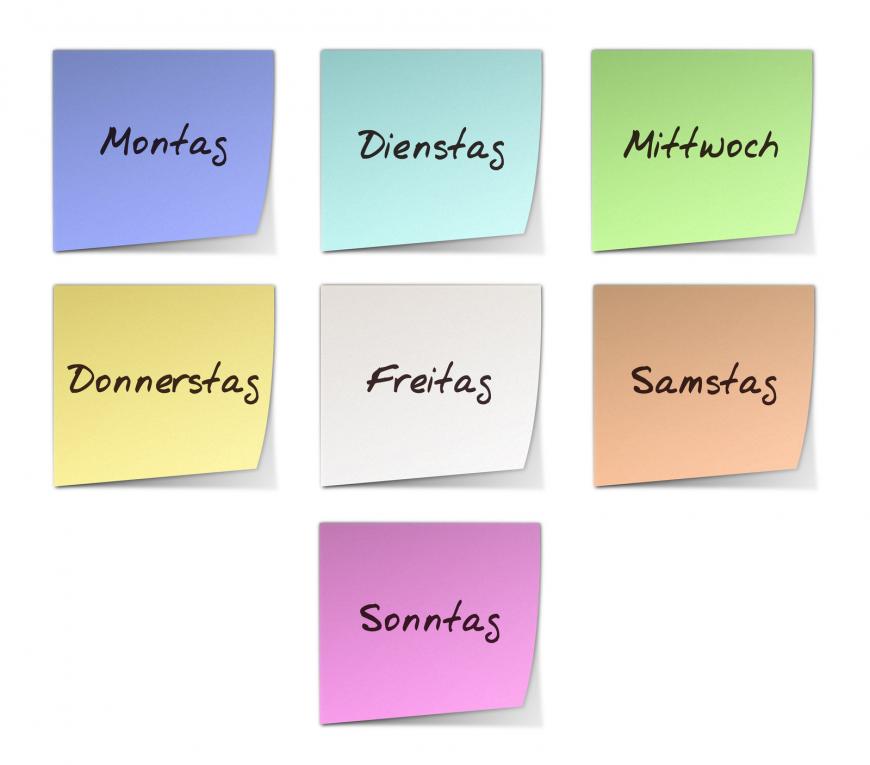10 Easy Rules to Help Your German:
 (Updated 3/2021)
(Updated 3/2021)
Learning German? A few easy rules will give your grasp of German grammar a boost. These rules are a kind of "back-ground language work" that you do, like setting up the frame of a building.
Grammar rules, even easy ones, are not what you think about when you’re engaged in speaking a language. In the flow of speaking, you don’t have time to think much about grammar. Conversations just move too fast. In a conversation, there's too much else going on.
However, when reading, listening to a podcast, doing some online practice, easy grammar rules are good to keep in mind. You'll keep seeing or hearing certain examples over and over again. With time, you’ll start to apply them automatically also for speaking.
1. Diminutive nouns with the ending -chen or -lein are neuter:
Note: in some cases, the stem vowel becomes an umlaut.
• das Mädchen (the girl)
• das Schwesterlein (the little sister) [but: die Schwester]
• das Tischlein (the little table) [but: der Tisch]
• das Gläschen (the little glass) [das Glas]
• der Vögelchen (the little bird) [but: der Vogel]
• das Brötchen (the roll) [das Brot]
2. Nouns ending in -heit, -keit, -ung are always feminine
• die Freiheit (freedom)
• die Gesundheit (health)
• die Freundlichkeit (friendliness)
• die Tätigkeit (activity)
• die Rechnung (bill/check)
• die Bewegung (movement)
3. “die” is the plural article for all nouns (subject forms)
• das Kind - die Kinder (child - children)
• die Frau - die Frauen (woman - women)
• der Mann - die Männer (man - men)
4. All seasons are masculine:
• der Frühling (the spring)
• der Sommer (the summer)
• der Herbst (the fall)
• der Winter (the )winter
5. All says of the week are masculine:
• der Montag (Monday)
• der Dienstag (Tuesday)
• der Mittwoch (Wednesday)
• der Donnerstag (Thursday)
• der Freitag (Friday)
• der Samstag (Saturday)
• der Sonntag (Sunday)
6. Seven common prepositions contract with “das."
Note: these all imply a “change of place” or “direction to”:
• an + das: ans Meer gehen (to go to the sea)
• auf + das: aufs Land fahren (to go to the countryside)
• in + das: ins Haus gehen (to go into the house)
• hinter + das: hinters Auto gehen (to go over behind the car)
• über + das: übers Meer fliegen (to fly across the ocean)
• unter + das: unters Buch legen (to place under the book)
• vor + das: vors Fenster legen (to place in front of the window)
7. A predicate adjective takes no ending
A predicate adjective follows a noun and a form of “sein” (to be).
• Die Straße ist breit. (The street is wide.)
• Compare this to "article + adjective + noun": Die breite Straße. (The wide street.)
• Der Kaffee ist stark. (The coffee is strong.)
• Compare this to "article + adjective + noun": Der starke Straße. (The strong coffee.)
• Das Haus ist groß. (The house is big.)
• Compare this to "article + adjective + noun": Das große Haus. (The big house.)
8. Numbers:
• 1-12 you have to memorize. Eins - one (1); zwei - two (2); drei - three (3); vier - four (4); fünf - five (5); sechs - six (6); sieben - seven (7); acht - eight (8); neun - nine (9); zehn - ten (10); elf - eleven (11); zwölf - twelve (12).
• 13-19 have the same format as English. For example: dreizehn - thirteen (13); fünfzehn - fifteen (15); neunzehn - nineteen (19)
• But 21-29, 31-39 etc. are “reversed” in German and are linked with "und" (and). For example: einundzwanzig - twenty-one (21), neununddreißig - thirty-nine (39), etc.
You can also learn the numbers and practice your pronunciation with our Quick Games: German Numbers 1-20 and 21 and Beyond.
9. The verb forms of formal "you" (Sie) and "they" (sie) are the same.
Note:
• Formal "you" (Sie) is always capitalized
• The pronoun "they" (sie) begins with a lower-case letter (except at the beginning of a sentence).
10. Word Order: In simple sentences, the verb is in second position.
• Ich gehe heute ins Kino. (I'm going to the movies today.)
• Heute gehe ich ins Kino. (Today, I'm going to the movies.)
Note:
• In the sentence "Heute Abend gehe ich ins Kino.", the verb is the third word, but still in second position, as the (adverb) phrase "Heute abend" is in first position.
• Whatever word/phrase occurs before the verb is emphasized.
You Want to Practice Your German?
Our games and travel-story based courses are also a great way to practice your German.
With our German 1 and 2 courses you'll learn and practice German for FREE - with stories of a young man traveling through Germany and - its sequel - solving a "Blüten"-mystery in Berlin. "The Story" and easy games will let you forget that you are actually learning German! And you can also listen to both Stories by clicking on German 1 or German 2 on our Podcast page.
If travel to Germany is in your near future, you may also enjoy our post: 4 Fun German Language Games Before You Travel.
